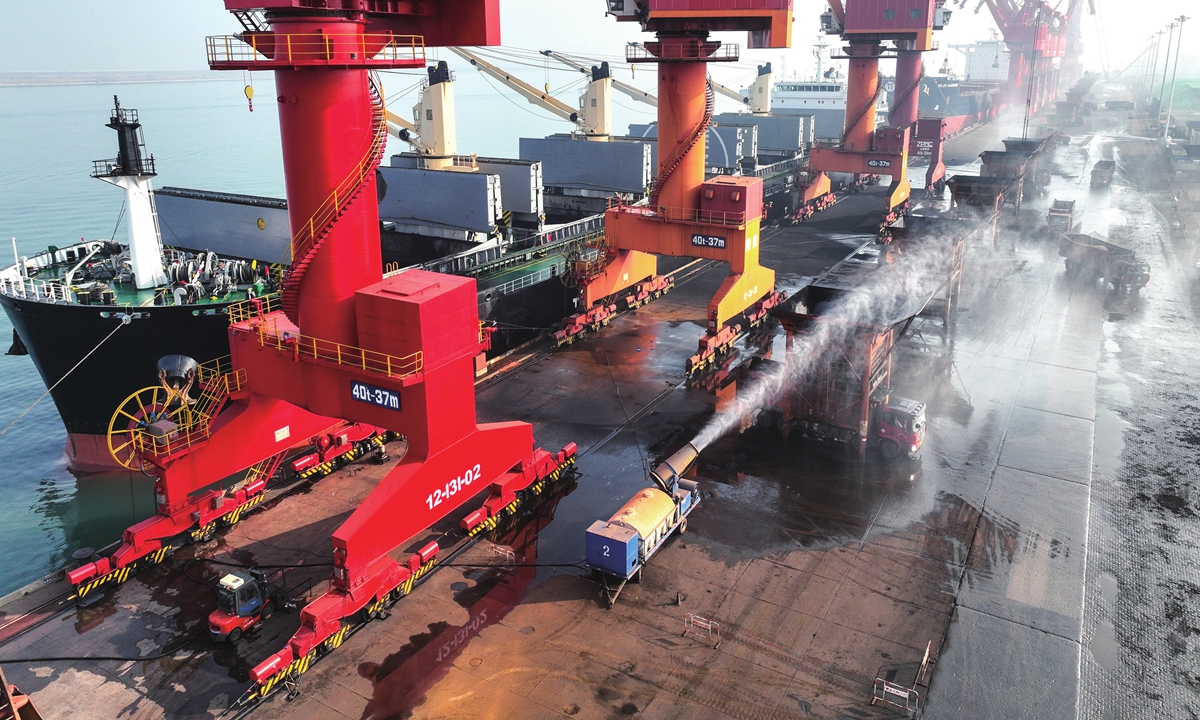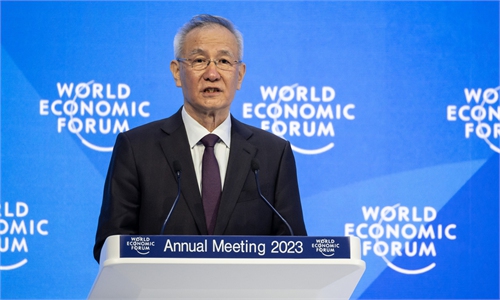Boost in global sentiment on China’s economy highlights China’s effective anti-COVID effort

A cargo ship unloads coal at a port in Lianyungang, East China's Jiangsu Province on November 16, 2022. The port has opened a "green channel" for thermal coal shipments ahead of rising winter demand, giving priority to vessels and their cargo to keep people in China warm and the economy stable during the cold months. Photo: cnsphoto
When China moved to optimize its COVID-19 response measures in early December and infections surged, foreign media outlets unleashed a tsunami of misinformation, fear-mongering and slander against China's anti-epidemic strategy over the past three years and its impact on the economy. Some overseas financial institutions even slashed forecast for China's economic growth in 2022.
Just several weeks later, as COVID-19 cases peaked, the vast majority of Chinese citizens returned to normalcy and economic activity picked up pace, many both in China and overseas have expressed surprise over the rapid pace at which China overcame the toughest period of the epidemic. Such a surprise became even more prominent after China on Tuesday reported a better-than-expected 3-percent growth for 2022, which prompted many global institutions to raise their China growth forecasts.
Following the release of the GDP figures, the Global Times received and analyzed research notes, comments and projection reports from about 10 well-known global financial institutions, including US-based Moody's Analytics, Netherlands-based KPMG, UK-based PricewaterhouseCoopers (PwC) and Japan-based Nomura. Many said China's GDP growth rate in the last quarter of 2022 beat their expectations and all of them forecast higher a growth rate in 2023, despite lingering risks and challenges.
Beating expectations
According to official data, China's economy grew by 2.9 percent in the last quarter of 2022, bringing the full-year growth rate to 3 percent. While headline GDP growth is significantly slower than previous years, many global financial institutions expressed surprise at China's economic performance, while pointing to the tremendous challenges it faced, particularly the severe epidemic situation in the last month of 2022.
"Q4 GDP growth came in at 2.9 percent year-on-year, well above of the consensus forecast of 1.6 percent and our forecast at 1.5 percent," Lu Ting and other economists at Nomura wrote in a note sent to the Global Times, adding that economic activities in December also exceeded market expectations.
Economists at Moody's Analytics and UK-based Capital Economics also shared the same sentiment. "We had anticipated that China's path out of zero-COVID would be a bumpy one … But, in what is shaping up to be a key macroeconomic event for 2023, the high frequency data that we track suggest that a significant rebound is already underway," Neil Shearing, chief economist at Capital Economics, wrote in a note.
Such comments stand in stark contrast to the rather dire picture painted by many overseas financial institutions shortly after China announced to optimize its COVID response measures.
The World Bank, for example, slashed its growth outlook for China's economy to 2.7 percent in 2022 from its previous forecast of 4.3 percent on December 20, amid surging cases in China. As China's economic recovery has accelerated since then, the bank last week predicted that China's economy will grow by 4.3 percent in 2023, while warning the global economy as a whole is "perilously close" to recession.
The rapid shift in global financial institutions' view on China's economic performance reflects both the effectiveness of China's anti-epidemic efforts over the past three years and the resilience of the Chinese economy, which often beats expectations and effectively debunks malicious claims hyped by foreign media outlets such as the "China collapse" claims, analysts said.
"These investment banks have raised their forecasts for China's economy, indicating that they are optimistic about China's investment prospects and development prospects this year compared to other countries," He Weiwen, a senior fellow at the Center for China and Globalization, told the Global Times on Tuesday, pointing to China's accelerating recovery after optimized anti-COVID measures.
While some foreign media outlets continue to hype China's 3-percent growth as the "worst" performance in "decades" or even "on record," they often ignore the harsh global conditions under which China achieved such a result as well as the sharp declines and profound economic woes in Western economies.
Many indicators show China's response to the pandemic is much more effective in both protecting public health as well as minimizing economic losses. In terms of GDP, China's average GDP growth over the past three years is about 4.5 percent, significantly higher than an estimated average of 1.27 percent in the US and a 0.37 percent-contraction in Japan, according to the Global Times' calculation of official data and forecasts by the World Bank and IMF. That's not counting decades-high inflations and other crises in the US and other major economies.
Some US and other Western officials have been constantly hyping the economic impact of China's anti-COVID measures over the past three years, but the final tally shows that their "let it rip" approach to allow the COVID-19 to spread early not only resulted in millions of deaths but also led to serious economic crises, let alone good economic growth they had hoped for, analysts said.
Higher expectations
Going forward, while the US and the global economy as a whole is facing serious risks of falling into recession this year, many have become increasingly upbeat about China's economic outlook in 2023.
"China missed the 2022 growth target by a wide margin, but we see light at the end of the tunnel… We keep our 2023 growth forecast at 5.8 percent," economists at UK-based bank Standard Chartered wrote in a note titled "China - Looking past the 2022 turbulence."
Standard Chartered is far from the only global financial institution that expects relatively high growth rate for China in 2023. According to the research notes, comments and projection reports from 10 global financial institutions, all predicted higher growth rates for China, with most predicting a growth rate of above 5 percent. Among them, the lowest is a forecast of 4.3 percent by Moody's Analytics and the highest is 6 percent from PwC China.
"If the impact of widespread infections nationwide on GDP growth is limited in the first quarter, it is possible that 2023 growth could reach 6 percent," G. Bin Zhao, senior economist at PwC China, said in a note sent to the Global Times.
The overseas financial institutions' expectation for fast recovery in China is "exactly the opposite of the downward trend of the world economy this year," He said, adding that these institutions may further raise their forecasts for China's growth in accordance to changes in China's economic development.
Compared with China's widely expected growth rate of above 5 percent, the global economy is projected to grow by 1.7 percent, the US economy is expected to grow by 0.5 percent in 2023, while Europe and Central Asia is likely to grow by a mere 0.1 percent, according to the latest World Bank report.
Such a grim global outlook could also pose downward pressure on China, especially the country's export sector, according to the global financial institutions and economists. Meanwhile, China is also facing other risks, including worsening geopolitical and trade tensions as well as the lingering impact of the epidemic, analysts said.
"In terms of trade, China is facing growing challenges from global recession to geopolitical concerns and we believe this trend will continue in 2023," Darius Tang, associate director of Corporates at Fitch Bohua, told the Global Times. "However, we still maintain an optimistic attitude toward China's economic growth this year despite all the challenges and uncertainties and the GDP growth would rise to about 5 percent under our neutral estimate."
Some analysts also noted that US' increasingly unhinged behaviors, including protectionist domestic policies and laws and unilateral economic sanctions against other countries, will pose challenges for not just China's trade but also the global economy as a whole.
However, such challenges will not stop China from achieving a higher growth rate this year, as the country has great potential in domestic consumption and sufficient policy tools to boost growth, economists said.
"COVID, macro and regulatory policies all turned supportive," the economists at Standard Chartered China wrote. "Consumption is likely to drive growth on pent-up demand, better income outlook and excess savings."


